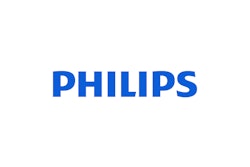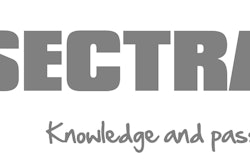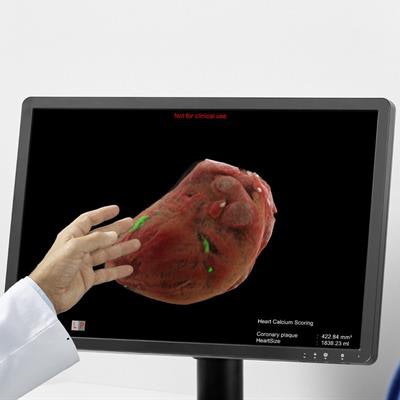
When you take a stroll through the extensive exhibition area at ECR 2019, you can't fail to notice that artificial intelligence (AI) is everywhere. Unsurprisingly, it is the dominant theme at this year's congress. In addition to new applications for enhancing radiology workflow and image processing, notable industry trends include the ongoing development of software platforms designed to make it easier for medical imaging professionals to adopt AI in clinical practice.
A new feature this year is the Artificial Intelligence Exhibition (AIX). Located in the X1 hall, the AIX enables attendees to meet small and medium-sized enterprises, take in sessions at the AIX Theatre, and participate in self-training on AI provided by Nvidia's Deep Learning Institute. The AIX Theatre will feature keynote presentations, interactive panel discussions, and eight-minute pitches from more than 20 companies.
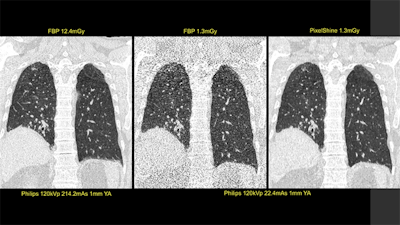 First image: Standard, high-dose CT at 12.4 mGy. Second image: Ultralowdose CT at 1.3 mGy. Third image: AI-enhanced ultralow-dose CT at 1.3 mGy. Diagnostic image quality between the first and third images was rated as comparable by independent radiologists, despite a significant dose reduction of 11.1 mGy. The second image is noisy and nondiagnostic. Image courtesy of Algomedica and Dr. Hugh Harvey, Kheiron Medical.
First image: Standard, high-dose CT at 12.4 mGy. Second image: Ultralowdose CT at 1.3 mGy. Third image: AI-enhanced ultralow-dose CT at 1.3 mGy. Diagnostic image quality between the first and third images was rated as comparable by independent radiologists, despite a significant dose reduction of 11.1 mGy. The second image is noisy and nondiagnostic. Image courtesy of Algomedica and Dr. Hugh Harvey, Kheiron Medical.At its booth, GE Healthcare is demonstrating software applications and "smart" devices built on Edison, its AI platform that ties together existing AI partnerships and products.
"For example, Centricity Clinical Archive provides a holistic clinical image patient record to help improve diagnostic confidence while embedded analytics provide operational insights into data study quality, creating a clean data platform for AI development and future functionality," said Jan Beger, director of application services for GE's digital business.
As part of an exclusive AI partnership, the vendor is also holding joint sessions on AI with the European Society of Radiology and will have a dedicated space in its booth for visitors to experience AI with interactive tools.
Elsewhere, TeraRecon is showcasing its EnvoyAI subsidiary's EnvoyAI platform, which includes a free portal for developers to upload and test AI algorithms, as well as an end-user portal to help users achieve their desired clinical workflows. The vendor is also spotlighting its Northstar AI Explorer software for viewing and interacting with AI results directly within a radiologist's reading workflow, as well as the iNtuition AI Adapter tool for bringing algorithms on the EnvoyAI platform into the clinical workflow of its iNtuition advanced visualization system.
 The latest version of Philips' IntelliSpace Discovery software platform is designed to facilitate the development and deployment of radiology AI algorithms for clinical and translational research. Image courtesy of Philips.
The latest version of Philips' IntelliSpace Discovery software platform is designed to facilitate the development and deployment of radiology AI algorithms for clinical and translational research. Image courtesy of Philips.Philips Healthcare is introducing IntelliSpace Discovery 3.0, a software platform designed to facilitate the development and deployment of radiology AI algorithms for clinical and translational research. The firm is also showcasing the Illumeo technology and has incorporated its adaptive intelligence capabilities into the IntelliSpace Portal 11 software, which is being launched this week at ECR 2019.
Meanwhile, Sectra is featuring its vendor-neutral AI platform, which provides customers with access to best-of-breed AI tools within existing radiology workflows. Customers can make use of AI-based algorithms developed by Sectra as well as third parties. The company is also introducing "smart" workflow accelerators that are designed to solve various radiology workflow tasks, such as using priorities or various risk scores to control workflow, or performing series matching to support manual display protocols.
Further initiatives to help delegates use AI to enhance workflow, support radiologists, and improve image processing are prevalent throughout the exhibition halls.
Siemens Healthineers is highlighting efforts to create digital "twins," AI-powered models that could be used to simulate a patient's individual organ physiology and potentially, to predict changes and treatment outcomes. These digital models could also help optimize workflows by predicting the impact of operational changes, according to the company.
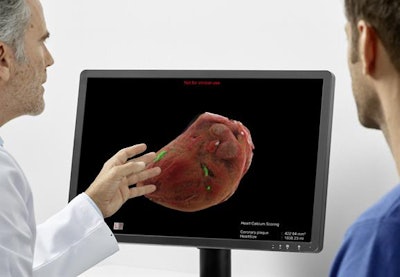 Designed to serve as an assistant for radiologists, Siemens' AI-Rad Companion Chest CT software identifies and measures organ lesions on chest CT images and automatically generates a quantitative report. Image courtesy of Siemens.
Designed to serve as an assistant for radiologists, Siemens' AI-Rad Companion Chest CT software identifies and measures organ lesions on chest CT images and automatically generates a quantitative report. Image courtesy of Siemens.Siemens is also showcasing the first application based on its new AI-Rad Companion radiology "intelligent software assistant" platform. Designed to help radiologists interpret chest CT images, AI-Rad Companion Chest CT identifies and measures organ lesions on chest CT images and automatically generates a quantitative report. Also on display is AI-Pathway Companion, an AI-based clinical decision-support system that helps physicians make diagnostic and therapeutic decisions along a patient's clinical pathway.
At its booth, Fujifilm Medical Systems Europe is highlighting the REiLI medical imaging and informatics AI initiative. The company is currently developing a number of AI technologies, such as Region Recognition for recognizing and extracting organ regions. Other works-in-progress REiLI applications include computer-aided detection for reducing image interpretation time and supporting radiologists' clinical decision-making, plus Workflow Support for optimal study prioritization, alerts for AI findings, and automated report population. Fuji is also offering live demonstrations of AI-enhanced radiology workflows in its booth. Another new Fuji AI application, FCT Pixel Shine, provides image processing of low-dose CT images.
Carestream Health is discussing workflow automation enhancements to its workflow orchestrator, enabling each imaging study to be read on time by a subspecialist affiliated with the acquisition site or preferred by specific facilities or referring physicians -- while evenly distributing the workload and complex examinations among the radiologists. The company is also showcasing interactive multimedia reporting capabilities that facilitate the creation of labeled datasets for machine learning. A work-in-progress Diagnostic Viewer + Diagnostic Aid application provides automatic organ and lesion detection, as well as quantitative characterization.
Samsung is demonstrating the integration of AI technologies in all of its imaging modalities. The vendor's S-Detect for Breast software evaluates breast lesions on ultrasound images, and it assists in standardizing reports and classifying suspicious lesions. In digital radiography, Samsung is showing its Auto Lung Nodule Detection application, SimGrid grid-replacement technology, and Bone Suppression technique. It is also unveiling an AI-based intracranial hemorrhage triage and notification diagnosis application. In addition, Samsung is discussing prototype software for displaying information such as knee cartilage thickness along with images of knee arthritis patients. Booth visitors can explore AI technology in a separate AI Zone.
Canon Medical Systems is presenting the Advanced Intelligent Clear-IQ Engine (AiCE), a deep learning-based image reconstruction technique on its Aquilion One Genesis and Aquilion Precision CT scanners. Designed to yield high-quality images at lower radiation dose levels, the product enables CT images to be reconstructed with improved spatial resolution and at a three to five times faster rate than model-based iterative reconstruction (MBIR) protocols, according to the vendor. It can be used with the Precision scanner to produce ultrahigh-resolution images at the same dose level as a standard CT scan.
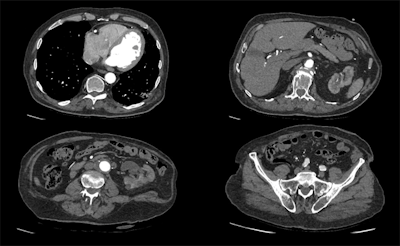 A 100-kV CT scan with a dose length product of 159.8 mGy.cm, using Canon's Advanced Intelligent Clear-IQ Engine (AiCE). Image courtesy of Radboud UMC, Nijmegen, the Netherlands.
A 100-kV CT scan with a dose length product of 159.8 mGy.cm, using Canon's Advanced Intelligent Clear-IQ Engine (AiCE). Image courtesy of Radboud UMC, Nijmegen, the Netherlands.Agfa HealthCare is directing attention to augmented and AI technology included in its digital radiography systems and Musica image processing software.
Ziosoft is highlighting the AI-powered quantitative imaging capabilities available on its Ziostation2 vendor-neutral advanced visualization platform. Ziostation2's preprocessing algorithms can also autonomously create images and cine studies, then reformat and transmit the results to PACS without any human intervention, according to the company.
Numerous other specialist AI firms also are showcasing their algorithms for a wide range of image analysis applications.
Originally published in ECR Today on 1 March 2019.
Copyright © 2019 European Society of Radiology






